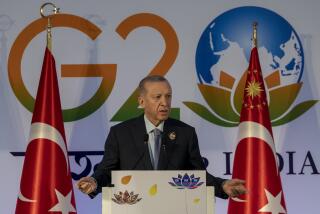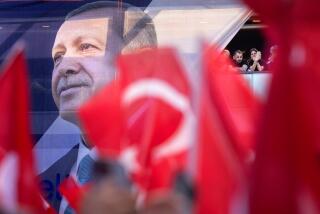Turkey Seeks a Say in Iraq as U.S. Ties Warm
- Share via
ANKARA, Turkey — Probably few Americans have heard of Col. William Mayville, but news that the commander of the 173rd Airborne Brigade in northern Iraq is to be transferred to Italy was celebrated in front-page headlines in Turkish newspapers this week.
“The colonel is finally going,” gloated Turkey’s largest newspaper, Hurriyet.
The American officer has been the object of national ire in Turkey since July, after he ordered the arrests of Turkish special forces troops in northern Iraq for allegedly plotting to kill a prominent Kurdish politician.
Coming only months after the Turkish parliament refused to allow thousands of U.S. troops to use Turkey as a launching pad to invade Iraq, the incident pushed relations between Turkey and the United States to their lowest point in decades.
The two NATO powers have been working to repair the damage, a process set to move forward next week during Turkish Prime Minister Recep Tayyip Erdogan’s first official trip to Washington since taking office 10 months ago.
Erdogan, scheduled to meet with President Bush at the White House on Wednesday, has signaled that he will push for Turkey to have a greater say in Iraq’s future. Bush is expected to urge Erdogan to help expedite a deal to reunite Cyprus on the basis of the latest United Nations peace plan for the island.
In a televised address to his nation Thursday, Erdogan said, “We will clearly express our sensitivities regarding the need to preserve Iraq’s territorial integrity and our opposition to the formation of any ethnic-based entity.”
Erdogan, Turkey’s most powerful prime minister of recent years, was referring to stepped-up demands by Iraqi Kurds for a semi-independent state that would include the oil-rich area around Kirkuk.
Turkey is wary that the nationalist aspirations of the Kurds, who were key U.S. allies in the campaign to topple Saddam Hussein, could reignite separatist passions among its own restive Kurdish minority. The United States plans to hand over control of Iraq to a sovereign government by June 30. The Bush administration has said that although it is committed to keeping the nation unified, it will leave the choice of governance model to the Iraqis when they draft a new constitution after the return of sovereignty.
To some Turks, that means the United States is ready to cave in to the Kurds’ demand for autonomy, which could lead to outright independence. Galvanized by such fears, Turkey has been courting formerly hostile regimes in Iran and Syria, which also have Kurdish minorities.
The Turkish army’s deputy chief of staff, Gen. Ilker Basbug, warned last week that should the Kurds persist in their claims for an ethnically based federation, the future would be “bloody.” Yet, in what one Turkish analyst called a significant policy shift, Basbug also hinted that a federation based on geographic lines -- the model being pushed by Washington -- might be more acceptable.
Basbug’s words followed a series of high-level exchanges between Turkish and U.S. military and civilian officials in recent months. Meanwhile, Turkey has been quietly helping the U.S.-led occupation in Iraq by opening bases and airspace to coalition aircraft and personnel. Last month, it agreed to allow up to 60,000 American troops to use the Incirlik Air Base in southern Turkey to rotate out of Iraq. Mayville will be among those leaving through Turkey.
“Compared to where we were six months ago, this relationship is in much better shape, better than anyone could have predicted at that time,” Eric S. Edelman, U.S. ambassador to Ankara, said in an interview this week.
It was on July 4 that 11 members of the Turkish special forces were arrested in the alleged assassination plot.
In November, Turkey’s parliament authorized the deployment of 10,000 troops to aid Iraqi reconstruction efforts. But the plan was abandoned by Turkey and Washington after the Iraqi Kurds threatened to fight them.
During the Cold War, the U.S. saw Turkey’s role as helping to contain Soviet expansionism. Today, said Edelman, Turkey can help “to reform the Muslim world.”
“A secular, democratic Turkey, moving toward the European Union, would be a horrible result for Al Qaeda,” he said.
European leaders have made it clear they will not consider Turkish membership in the EU unless Ankara helps resolve the dispute over Cyprus, which is split into a Greek Cypriot-controlled south and a Turkish-occupied north. Erdogan says he is committed to a solution. He is expected to discuss the issue with U.N. Secretary-General Kofi Annan today in Davos, Switzerland.
More to Read
Sign up for Essential California
The most important California stories and recommendations in your inbox every morning.
You may occasionally receive promotional content from the Los Angeles Times.










